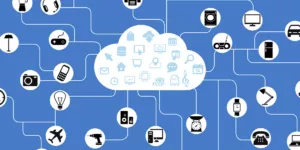From small-scale appliances all the way up to entire cities, the world around us is getting progressively smarter. The development of the Internet of Things is changing the way we live, travel, and work. For small business owners, the technology that accompanies the IoT can have a beneficial impact on the bottom line. Here are a few ways that the IoT can potentially save money, from a small business perspective.
1. A more efficient commute
One of the first ways that the IoT can save money for workers on a daily basis is by creating a more efficient commute. As cars and motorway networks become increasingly interconnected, travel time and fuel usage can be reduced. Today’s connected cars are a good example of IoT technology that we already have. You can expect cars to become even more connected in the near future, with real-time traffic data and diagnostics to help you avoid traffic jams. As city transportation networks join the network, we’ll see traffic light and roadside sensors contributing to the real-time data flow, for improved traffic patterns and more efficient diversions.
2. Smoother inventory management
For those who work in the retail or manufacturing industry, the IoT will save money when it comes to logistics. Tracking packages can be a lot more accurate with the use not only of GPS data but also shipping conditions like humidity and temperature. This can prevent spoilage of products and help business owners pinpoint exactly where each piece of the puzzle is at any given time. Expect to spend less time hunting down packages, as well as a reduction in in-transit losses.

3. Use data to prevent costly mistakes
It’s common for small businesses to lose money not only in shipping logistics, but also in other areas of daily operations. The massive flow of big data enabled by the IoT from Nokia Networks or other providers will help entrepreneurs resolve recurring issues with more information at their fingertips. If a product spoils or an employee is causing accidents, analysing data will reveal the problem and make it easier to fix.
4. A greener office
Within the office, interconnected devices will be able to become part of a smart grid system. Control lighting, heating, and cooling systems in a more efficient way according to your usual business patterns. The IoT will help make energy production more efficient, lowering your utility bills as a business.
5. Targeted advertising
Tracking the way your customers interact with their products will lead to smarter, more efficient and highly targeted advertising. Rather than wasting money on campaigns, you can target the individual according to his or her own patterns. Data gleaned from connected devices allows businesses to create smarter, more useful products.
6. Hands-off, remote management
As a small business owner, you may already do a great deal of your work remotely depending on your industry. But as more systems and devices become connected, you can increase this percentage to save even more time and money. New smartphones have been designed that can manage other devices. As machine-to-machine communication grows, there is less of a need for human micromanagement. This saves manpower and money.








